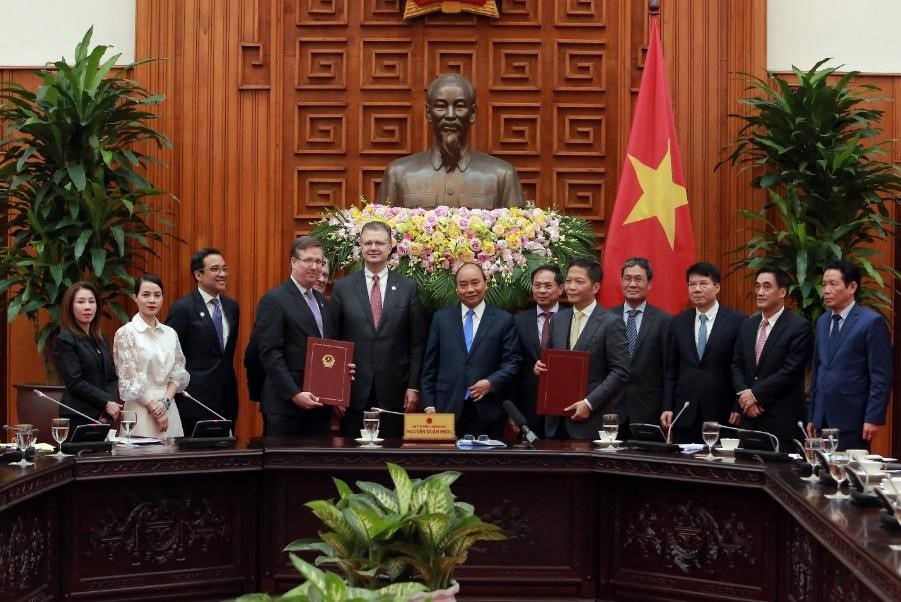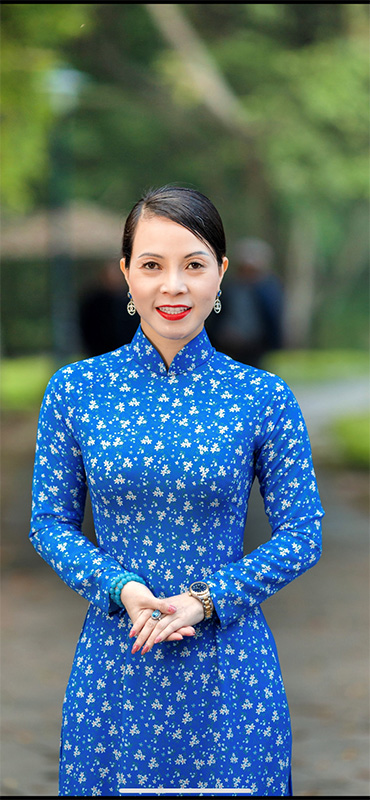For MPM alumna Bui Kim Thuy, serving her country is not an obligation, but a personal mission.
Thuy is currently the Senior Country Representative for Vietnam at the US-ASEAN Business Council, or USABC. She tells us why she’s always had her eye on public service and reveals the one critical skill that she gained from her time at the LKY School.
Tell us about your work with the USABC.
[ALUMNI-INFO TEXT="The USABC is a non-profit organisation and we represent about 160 multinational member companies. In particular, we support our members in South-east Asia to foster economic relations with the US.
One of the USABC’s priorities is seeking out opportunities to promote the US-Vietnam relationship.
In the 1990s, the Council—along with highly influential members from the economic and political spheres in the US—supported efforts to abolish the American trade embargo on Vietnam and formally normalise US-Vietnam diplomatic relations.
Subsequently, in the 2000s, the Council advocated for the US-Vietnam Bilateral Trade Agreement, established an alliance to support Vietnam’s entry into the World Trade Organization, and called for the adoption of Permanent Normalized Trade Relations with the US. For many years, the Council has also actively mobilised supporters for Vietnam in the negotiation of the Trans-Pacific Partnership Free Trade Agreement."][/ALUMNI-INFO]
I represent the USABC in Vietnam, in our dealings with government officials at meetings and events. We work closely with Vietnamese ministries and state agencies to advocate policies that are conducive to bilateral relations with the US, as well as to anticipate and mitigate roadblocks to future collaborations. I provide information and advice to US companies doing business in ASEAN and Vietnam, and I share business-related insights with Vietnamese policymakers. One of my focus areas is facilitating Vietnam’s SMEs to join regional and global value chains in the era of digital transformation.
To sum it up, it’s a very interesting job, because no two days are alike!

An MOU was signed between the USABC and the Ministry of Industry and Trade of Vietnam, witnessed by Prime Minister of Vietnam Nguyen Xuan Phuc, on 4 March 2020. Thuy is second from the left.
What’s the hardest part of your job?
[ALUMNI-QUOTES TEXT="Ironically, my greatest challenge currently is... not having any challenges.
I have encountered obstacles while on the job, especially when I first joined the USABC in early 2018. I had to adapt to a new working environment, moving from the public sector at the Ministry of Industry and Trade, where I’d served for 13 years, to the private or NGO sector with the USABC. I also had to adjust to a high-responsibility role in a multicultural work environment, where my best performance is always expected.
But by now, I’ve eased into my work, and I need to find new ways to push myself. When you’re accustomed to facing challenges, you learn to welcome them into your life, just as you would a friend. I believe one should never choose a simple task over a difficult one—if you do, you won’t learn or grow."][/ALUMNI-QUOTES]
Has Covid-19 affected your priorities at work?
The Covid-19 pandemic represents a public health, development, and mobility crisis exacerbating vulnerabilities and inequalities around the world, including in Vietnam and Singapore. The pandemic has had major multidimensional impacts on the lives of all populations, especially women and children. If possible, I would like to see more resources across ASEAN being allocated to help women upskill or reskill, especially for those in MSMEs (micro and small-to-medium enterprises), so that they can be well-equipped with new technologies to work more effectively in the new context of Covid.
Until you find your next challenge, what keeps you motivated?
The sole purpose of my life’s work has been to help build a better Vietnam. But here at the USABC, I’m part of a collective effort to not only build a better Vietnam, but also a better ASEAN, and a better understanding and relationship between ASEAN and the US.
Ultimately, I am where I would like to be. I’ve always thought that if I were to work for a company, doing my job well would translate to good products or services for consumers. But if my work is related to the public sector, then the “product,” be it a service or policy, can bring a much bigger benefit to more people in society. That’s the reason I chose to work in the public sector at the start of my career, and even at the USABC, much of my time is still spent discussing policy, covering not only trade but also other aspects of the economy, especially digital-related policies.
As an undergraduate, you majored in international economics. What sparked your interest?
I pursued international economics to broaden my mind. To do this, I first had to understand where I came from, and then find out what the world around me was doing, especially an economy like Singapore, which went from “zero to hero” in just a few decades. Singapore’s success story was also why I wanted to further my education in Singapore at the LKY School.
You were the only candidate from Vietnam in 2013/14 to receive a full scholarship for the LKY School’s MPM programme. Why do you think you were selected?
I may not have been the “best” candidate, but perhaps I was the most suitable candidate at the time. I do think that my role then, as a member of the FTA Negotiation Team in Vietnam’s Ministry of Industry and Trade, dovetailed with the LKY School’s expectations about the types of leaders, or future leaders, whom they wanted as part of the cohort.
While you were in Singapore, what gaps were you hoping to fill at the LKY School?
I wanted to learn to adapt to a multicultural environment. Before studying at the LKY School, I spent several years dealing with foreign colleagues during the negotiation process for free trade agreements. However, I still felt that I wasn’t completely comfortable trying to integrate into an international community, because of our cultural differences. After one year at the LKY School, I became totally at ease with communicating across cultures, and that was really what I wanted to gain from my LKY School experience.

Thuy dressed in Ao Dai, a Vietnamese national garment.
How else has the LKY School changed you?
The School helped to “upgrade” me into an improved version of myself—someone who could deliver results at short notice. Because of the pace of learning at the LKY School, I gained a different perspective of work, and how it should fit into one’s life. Once you’re intrinsically motivated, you don’t feel resistance towards work, or the pressure to maintain a work-life balance, because work is an integral part of life. And when you do the right things with outstanding results, it creates a positive energy that refreshes you and pushes you to do more.
You haven’t quite left the LKY School, as you’re the president of the LKY School Alumni Vietnam Chapter! Tell us about that.
Our alumni leaders have an especially important role to play in fostering a sense of community and connection. We held our inaugural LKYSPP Alumni Chapter Presidents’ E-Summit in July 2020, where we shared our efforts to engage fellow alumni. Within Vietnam, our alumni community has been supporting the Community Library, built and run by the Chapter’s vice president Harry Pham (MPA 2017). This library has provided a local disadvantaged community with access to quality education.
One of our key objectives is also to maintain close ties with Singapore, and over the years, we have built links with the Singapore Embassy and other Singapore-related organisations in Vietnam. We’re looking to form relationships to facilitate collaborations for common good—I believe that together, we are better.